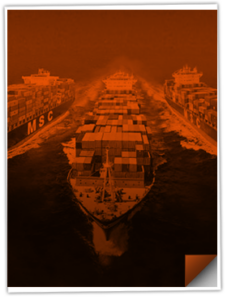Featured Headlines:
DUN-DUN-DUN…FDA Leniency Ending!
USTR Considering Section 301 Extensions for Extenuating Circumstances
Parts Factor in Factory Production Hole
Charleston Congestion Intervention
This Flippin' Air Freight Shippin'
No Ifs, Ands, or ISFs!
- US Customs and Border Protection (CBP) is planning to retire the Importer Security Filing (ISF) Portal within the Automated Commercial Environment (ACE) effective June 6, 2022.
- To help support its efforts and prepare relevant parties, CBP will start notifying users attempting to access the ISF Portal via the ‘Launch ISF’ feature of its migration to the ACE Portal beginning May 14th. At that time, officials will also offer further guidance on how to submit an ISF within ACE Reports and provide affected parties with a list of partners within the trade community that can assist with ISF filings made via Electronic Data Interchange (EDI) applications.
- Click here to read CSMS #51726539 – ISF Portal Retirement.
DUN-DUN-DUN…FDA Leniency Ending!
- On July 24, 2022, the Food and Drug Administration (FDA) will terminate its temporary policy allowing Foreign Supplier Verification Program (FSVP) importers unable to immediately obtain a DUNS (Data Universal Numbering System) number to transmit the value ‘unknown’ (UNK) in the Unique Firm Identifier (UFI) field for shipments subject to FSVP regulations.
- According to FDA officials, food importers subject to FSVP no longer require a grace period to adjust to the new requirement, as they have already been given enough time to adapt operations accordingly.
- Click here to read CSMS #51738135.
- Click here to view the FDA Guidance for Industry.
USTR Considering Section 301 Extensions for Extenuating Circumstances
- Earlier this week, the Office of the U.S. Trade Representative (USTR) notified representatives of domestic industries that have benefited from Section 301 tariffs of the possible termination of the duties and asked representatives to request a continuation of the tariffs if desired.
- If the USTR receives one or more requests for an extension prior to July 6, 2022, it will publish an additional Federal Register notice to announce the continuation of tariffs while it conducts an official review. However, if the USTR concludes that the additional tariffs provided no benefits at all, they will be terminated.
- Requests for extension must be submitted via the USTR Comment Portal by July 6th.
- Click here to view the official Federal Register Notice.
Domestic Pit Stop Back Drop
- The Union Pacific Railroad (UP) is re-designing their Southern California intermodal system by dedicating certain ramps to specific destination regions.
- Today, the UP accepts cargo for all destinations at all ramps, which requires plenty of property for cargo sorting; however, the UP expects to better align cargo receiving with ultimate train destinations by June.
- The UP also announced plans to buy 5,600 new chassis and to equip all rail-owned containers with GPS trackers.
- The Federal Maritime Commission (FMC) is seeking more jurisdiction over containers moving by rail on a through bill of lading. In particular, the FMC wants to oversee door-to-door ocean carrier moves, as shippers have complained loudly about demurrage and detention charges associated with ocean carrier haulage via rail.
- The Federal Motor Carrier Safety Administration (FMCSA) has issued a notice of intent to mandate the installation of speed “governors” for commercial vehicles weighing more than 26,000 pounds.
- In 2019 alone, there were approximately 900 fatal crashes involving commercial vehicles in areas with posted speed limits of 70 miles-per-hour or more.
- FreightWaves estimates that national trucking capacity is up 170% in the last 12 months.
Parts Factor in Factory Production Hole
- US factory production grew at its slowest pace in 18 months for April 2022, according to The Institute for Supply Chain Management.
- Raw materials and parts from Asia are moving slowly due to COVID lockdowns and delays; without those essential imports, many US manufacturers cannot complete finished goods.
- Manufacturing represents just over 12% of the US economy, and despite the bad news, the segment is still seen to be growing— just much slower than in recent months.
- Somewhat alarmingly, the broad index for tracking US factory growth shrunk by a full 3% from March to April 2022.
- Worries for many manufacturers have compounded amid the loss of their Russian and Belarusian export markets and added war-related shipping complications for exporting to the Ukraine.
- Looking ahead, government data shows that consumer spending on services vs. manufactured goods is stronger today than at any time in the last nine months. So, it seems like US production may be sluggish for some time to come.
Global Shipping Grab Bag
- As Bangladesh enjoys the Muslim religious holiday Eid-ul-Fitr, vessels continue to line-up outside Chittagong. By this weekend, the total number of vessels at anchor is expected to eclipse 30, with a growing queue arriving in the next week.
- Maersk has announced plans to cease all cargo operations in Russia and Belarus by the end of 2022.
- President Zelensky has advised that Ukraine will almost certainly lose tens of millions of tons of grain due to seaport closures for export; he also expects an import food crisis for parts of Europe, Africa, and Asia.
- European Union (EU) leadership is attempting to ban the import of Russian fuels even though it currently receives 25% of its oil from Russia. The political battle among the twenty-seven EU member countries is expected to be intense, with Hungary and Slovakia already voicing their strong opposition to the measure.
Charleston Congestion Intervention
- The port of Charleston is finally down to 5 vessels at anchor, after months of congestion struggles brought on by winter weather and the re-routing of Savannah cargo!
- Despite the bad press for US port productivity, Charleston has impressed the industry with innovative solutions for the chronic cargo surge and persistent congestion.
- Firstly, Charleston incentivized vessels that had more containers to pick up for export than containers to discharge for import by allowing them to skip the line of vessels at harbor for berthing.
- Secondly, Charleston leased 800 chassis to help with cargo fluidity on-port.
- Thirdly, it borrowed a trick from neighboring Savannah, Charleston by making use of pop-up warehouses to help provide much-needed space on-port.
- Finally, Charleston opened the port on Sundays to offer more hours and appointments to chip away at the backlog.
- While the overall process was painful and even led to intermodal rail shutdowns, Charleston’s multi-pronged and relentless plan is worthy of our applause.
This Flippin' Air Freight Shippin'
- While inbound control measures will still be strictly enforced, Hong Kong’s government will relax the following COVID rules effective May 1:
- Upon proof of vaccinations and a negative test result, non-residents will be permitted to enter Hong Kong.
- Layover airline crews will also need proof of a negative test but can avoid long quarantines by following a closed-loop protocol while on airport property.
- Locally based cargo crews will no longer need to quarantine, and locally-based passenger crews face a much shorter quarantine.
- The new rules will help Cathay Pacific and other larger airlines return to Hong Kong for long-haul flights; many airlines had pulled out of Hong Kong due to crew complaints and added expenses.
- As local Beijing authorities shut down all schools, metro stations, and bus routes, Beijing International Airport remains open. The local government stressed that they want to keep cargo flowing, but Beijing wants to avoid Shanghai’s Covid fate.
- Speaking of Shanghai, Pudong is currently handling about 30% of normal cargo volumes. That said, local Covid cases have declined for the 8th straight day, spurring some hope for a more normal reality in Shanghai and surrounding areas.
- IAG Cargo has expanded air cargo services between Spain and the US to 120 weekly connections—a 40% increase. IAG’s Madrid operation alone handles 250,000 tons of air cargo each year.



